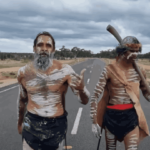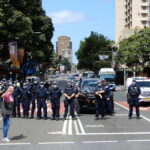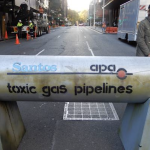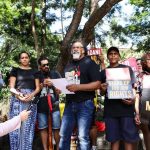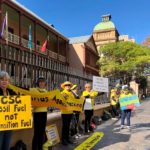First Nations Oppose Ongoing Landgrab as Labor Relaunches Gas-Led Recovery
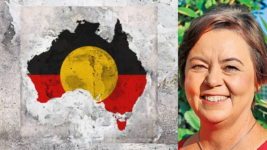
Resource minister Madeline King announced the Future Gas Strategy on 9 May, which involves increased investment in gas, a fossil fuel that produces emissions that increase climate change, to reduce the impacts of climate change, along the way to net zero fossil fuel emissions by 2050.
True, this appears to be skewed logic, but it’s necessitated if Labor wants to simply plod along with former PM Scott Morrison’s 2020 launched gas-fired recovery, which appears to be the case, with the only difference that the Liberals didn’t see any need to link the plan to net zero emissions.
Indeed, on election, the Albanese government promised to “end the climate wars” and that’s now being achieved by reestablishing Coalition policies favourable to industry that appear climate-friendly, as was seen with last year’s reimaging of ex-PM Tony Abbott’s 2016 Safeguard Mechanism.
Yet, pulling the wool over the constituency’s eyes in regard to climate is getting more difficult nowadays, especially as the effects are ever-present.
So, the spruiking of expansions into liquefied natural gas in order to progress renewable energy, instead of simply investing in the latter, is wearing a little thin.
And as a coalition of First Nations leaders asserted on the day of the announcement, the key projects involved in the gas strategy are all set to be established on unceded Indigenous land, with no prior informed consent even being sought by Labor, let alone provided by anyone.
Decarboning via carbon emissions
“Claims by minister King that the gas industry employs 20,000 people across the country are insignificant in comparison to the water security and the responsibility of Traditional Owners to protect it,” reads the 9 May statement that 62 community representatives cosigned it.
“New gas projects pose great threats to our lands, waters, surrounding islands and the health of our natural ecosystems and biodiversity for this generation and future generations of all people who occupy these lands,” the collective voice maintained.
During an ABC interview on the day the strategy was unveiled, King identified Santos’ Narrabri gas project as an important part of the strategy, which uses “gas to firm up the renewables to 2030”, as it is set to supply the state of NSW ongoing.
Yet, in doing this, the resource minister completely overlooked that the Santos project has been vehemently opposed by the Gomeroi Nation for the past decade and a recent Federal Court ruling has overturned an earlier native tile greenlighting of the project, which has jeopardised its future.
“We are all feeling very empowered at the moment. The case is still going on,” Gomeroi elder Aunty Polly Cutmore told Sydney Criminal Lawyers in the wake of the court ruling. “The decision realised that Gomeroi people aren’t selling out and First Nations people aren’t selling out for a pittance.”
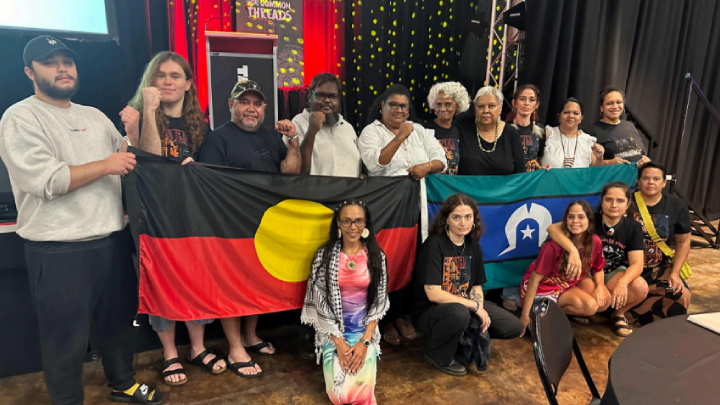
Gas-fired recovery 2.0
King further told the ABC that the Future Gas Strategy analytical report has required much time and extensive research with submissions taken from the community, environmental groups, local councils, unions, and also from the industry, but not it seems from First Nations representatives.
The report states that “all scenarios” leading to net zero require gas to 2050, with the role for gas in harder-to-substitute uses to be open for determination further down the track, as it’s a decision that will rely on other forms of abatement, like Morrison’s favoured carbon capture, being available.
The document further suggests that demand for gas exports in the Asia region is set to continue beyond 2050, as some economies will preference its use, and domestic shortages are likely in the near-term on the east coast, which, if supplied from the north of the continent, will increase costs.
In the report chapter titled ‘Basin by basin development potential’ key factors determining new supply will be price expectation and ability to underwrite exploration and development yet concerns around First Nations opposing the exploitation of their lands appear to be a nonissue.
The chapter further discusses the “most likely to be developed but yet-to-be sanctioned fields” that comprise Surat, Beetaloo and Narrabri basins, which were on Morrison’s agenda. And it posits that making up gas shortfall in southern states relies on Narrabri, even though the project is in dispute.
Without consent
Santos is planning on drilling 850 coal seam gas wells on Gomeroi County, most within the Pilliga Forest. But this doesn’t appear to worry King, and neither does the fact that they’re being drilled through the Great Artesian Basin, turning one of the globe’s largest freshwater reserves toxic.
The Albanese government tasked the minister to come up with her strategy last May, during a year when it prominently campaigned around enhancing Indigenous input into mainstream politics, and yet, the issue of destroying Country for all time doesn’t seem to have been worth the consultation.
And not only is federal Labor releasing planning reports about yet-to-be secured Indigenous land to be exploited, it also has a piece of AUKUS-related legislation before parliament that facilitates the establishment of dumps for high-level radioactive waste that lasts 100,000 years.
The innocently titled Australian Naval Nuclear Power Safety Bill 2023 allows for multiple radioactive waste dumps to be established on unceded Indigenous land, and these sites will not only store local waste, but will also serve as a solution for US and UK long-term disposal issues.
Get fracked
The Traditional Owners issuing the statement represent groups from across the continent and Zenadh Kes, and they all strongly oppose any new gas projects and they further advised minister Madeleine King that “new gas initiatives, fracking and offshore gas mining are not welcome”.
“And without proper consultation and free, prior and informed consent, minister King is not welcome in our communities either,” the representative further declared.
But one aspect of the Coalition’s climate policy catastrophe Labor has improve has been international opinion in relation to it, as “Morrison’s Australia” was labelled a climate criminal, yet, these days, new coal and gas still stands firmly, while no one is pointing the finger about it.
“The Australian government must shift from prioritising the export industry over the people, lands, air and water,” the First Nations representatives of the statement to the minister asserted.
“Our collective message to minister Madeleine King and the Australian government is to stop yielding to pressure tactics from Santos, Woodside and other energy corporations.”


